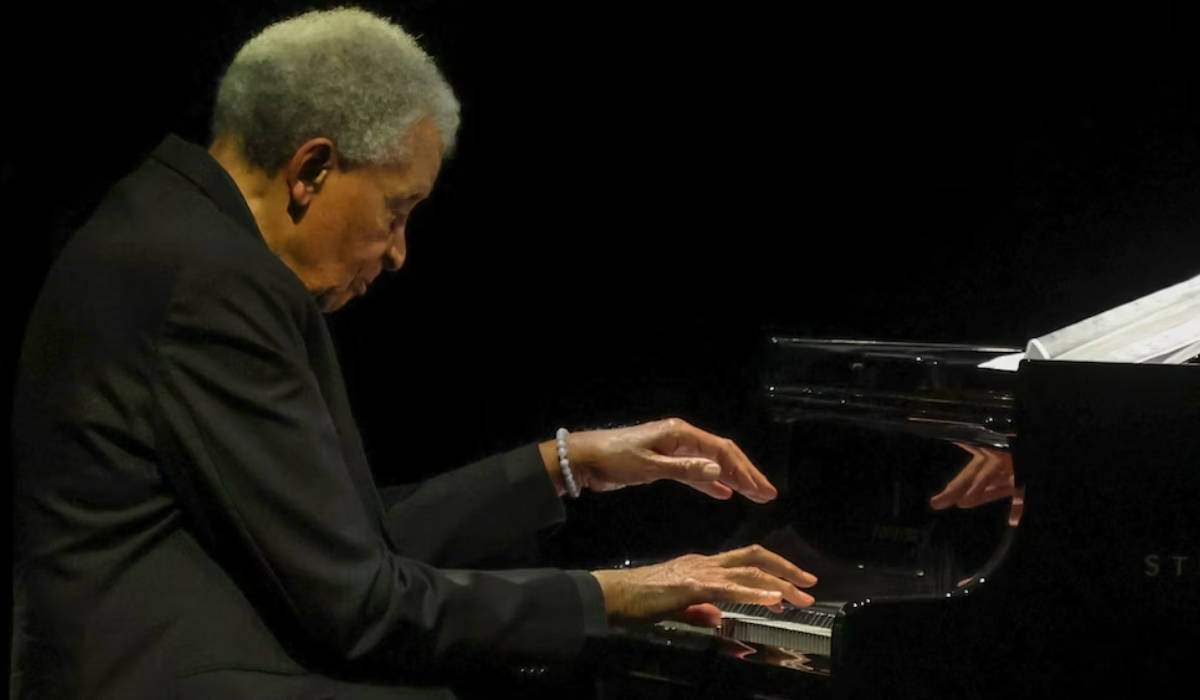The jazz pianist and composer Abdullah Ibrahim is one of the influential voices of South Africa. His music became the soundtrack of the resistance against apartheid and accompanied Nelson Mandela’s Freedom Struggle. Last year he celebrated his 90th birthday. With PIANIST he talked about his fascination for Fazioli grand pianos and new concert projects.
Abdullah Ibrahim “Our Mozart”
In the silence lies the power – a maxim that shapes Abdullah Ibrahim’s work for decades. The South African pianist was born in 1934 as Adolph Johannes Brand in Cape Town. First known as Dollar Brand, he converted 1968 to Islam changing his name to Abdullah Ibrahim. With his music he has created his own and unique sound universe. His solo works and trio recordings reveal a depth lived not through virtuoso brilliance, but through meditative intensity. Early imprints by the American Methodist community, his family and the township sounds of South Africa form the basis for his style. Thelonious Monk, Duke Ellington and Randy Weston provided further components for Ibrahim’s music, which still remains unique and distinctive.
He started his career in the late 1950s, played with the saxophonist Kippie Moeketsi and the trumpeter Hugh Masekela, before he emigrated to Europe in 1962 with the singer Sathima Bea Benjamin, his future wife. In Zürich, Duke Ellington discovered him and supported him to release his first record. Already here Ibrahim’s sense for earthy, repetitive motifs unfolding organically is revealed.
Sound Meditations On The Piano
Ibrahim’s solo piano works are characterised by a a deep inner peace. Pieces like Ancient Africa or Senzo are like musical meditations. Jazz is just a foil here – underneath spiritual music in the best of its form. You can feel the African roots, but also influences of impressionism and minimalism. The left hand weaves constant patterns, above melodies unfold in gentle waves. As a master of reduction, he draws from repetition the power of variation.
Trio Art And Orchestral Width
But Ibrahim is not just a soloist. His piano trio recordings belong to the central works of the genre. With the bassist Johnny Gertze and the drummer Makaya Ntshoko he shaped in the 1960s a sound that clearly lifts off from the American role models. Later he played with American greats like bassist Cecil McBee and drummer Billy Higgins, but his play always remained the same at its core: hypnotic patterns, a natural dynamic and a deep sense for space and time.
He also achieved great success with his compositions. His Township- Grooves oriented piece Mannenberg written in 1974, became the unofficial anthem of the anti-apartheid movement. Even orchestral works such as the African Suite carry this handwriting. The music is permeated with memories of the Homeland – the timbres of the Kalahari, the rhythms of the Cape Malay, the spirituality of church music. In the last decades Ibrahim has further refined his play. His way of touching the keys became softer, pauses are more meaningful. The listener hears not alone notes, but whole landscapes. He is a pianist of contemplation, whose music does not impose itself, but gradually unfolds. A magician of repetition, who with minimal means achieves maximum effect.
Chosen Homeland Chiemsee
Since 2012, Ibrahim has been based in Germany, more precisely in the Bavarian Aschau at the Chiemsee. There he lives withdrawn with a medical doctor from Italy, whom he met in South Africa. She worked in a hospital at that time and attended one of his concerts as someone recommended her to listen to this “crazy musician”, remembers Abdullah Ibrahim, “and here we are now.” They moved to Aschau, since his wife had already lived there before, working in a children’s hospital. The South African has a good connection to the First Mayor of Aschau, he gives regular concerts at the Gasthof Hirzinger on a Fazioli grand piano. Ibrahim loves the instruments of the Italian luxury manufacturer: “They are fantastic! When I first played a Fazioli, it was absolutely magical.” Ibrahim has been since many years friends to the company founder Paolo Fazioli. “I visited several times the factory. It is state-of-the-art. Paolo combines high tech with tradition. Some of the wood that is used for Fazioli pianos, by the way, comes from a forest near Sacile, the same wood is also used for the construction of Stradivari violins.”
Soon Abdullah Ibrahim will go on tour again. Concerts accompany him all his life: “Since I was 16 years old, I’ve been on tour” he explains. Traditionally, at the beginning of the year there is always a tour break, were he can relax at home, then in March it goes “on the road” again, as he describes it. He will give two solo concerts, one near Paris in the cultural center La Seine Musicale, another in Weimar as part of the concert series Schallkultur. In August, Ibrahim has a solo appearance in his new chosen home Aschau, and in October he will go to New York, a city he is still closely connected, as he lived there for 40 years. There he will perform during two days several of his compositions with different ensembles at the Lincoln Center. “This is a knight’s stroke for me,” he said proudly. In addition, Ibrahim will perform in November with his trio in several European cities, including Utrecht, Ludwigshafen and Prague. In addition to him, the trio includes the saxophonist Cleave Guyton, who also masters the flute and clarinet excellently, as well as Noah Jackson, he plays the cello and double bass. So it is not a classic jazz trio cast, as drums are missing, it is rather a kind of chamber music trio, like one knows it from classical music. This abundance of projects shows: even at 90, Abdullah Ibrahim does not think of quitting. We hope that we may still experience this great musician, once referred by Nelson Mandela as “our Mozart”, for a long time.
Original article written by MARIO-FELIX VOGT Translated M. Umari
